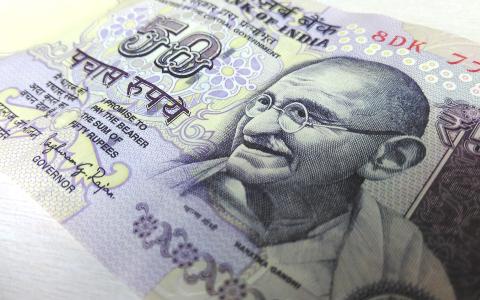
(Bloomberg) - Investors have been taking refuge from the Chinese real estate debt crisis in pockets of the broader Asian credit market, and cite India among opportunities that are relatively insulated from the historic turmoil.
Goldman Sachs Group Inc. has recently adopted a positive stance on Asia high-yield bonds. Bank of New York Mellon Corp. data indicate South Korea, Indonesia, Singapore, India, Malaysia and Japan all recorded capital inflows into corporate debt in the three months through Jan. 18, while China experienced outflows.
Rising inflation means there have still been losses for broader Asian bonds-- as there have been in many parts of credit markets globally -- but they’ve been much milder. Dollar notes of all ratings from Chinese issuers have lost about 3.7% in 2022 even after a rally in recent days for property developer securities sparked by policy support.
That compares with just 1.5% for Indian borrowers, 0.8% for South Korean firms and 0.7% for Philippine credits, according to a Bloomberg index.
“Investors have been hiding in Indian investment-grade and high-yield credit, and other parts of Asia outside of China, as a means to reduce their exposure to China property,” said Wai Mei Leong, a portfolio manager at Eastspring Investments.
One recent example of a money manager to have cut exposure to Chinese bonds is BDO Capital & Investment Corp., which sold its holdings of such securities, President Eduardo Francisco said last week.
BlackRock Inc.’s Neeraj Seth told Bloomberg Television’s Yvonne Man on Tuesday he thought 2022 “should be a reasonable year for Asia.”
Both Goldman and CreditSights consider Indian companies attractive. The U.S. bank recommends high-yield renewables, while the latter considers financial firms to be best shielded from the troubles in the world’s second-largest economy.
Still, there are plenty of risks for the broader Asian credit market. Because of demand from investors seeking to diversify, CreditSights said valuations for Asian credit outside of China have already been driven tighter. That means many South and Southeast Asian names warrant only a market perform rating, despite good fundamentals, it said.
Having taken a beating last year and for the first couple weeks of 2022, Chinese property dollar bonds have rallied in recent sessions thanks to a string of policy steps to ease restrictions on the real estate industry and broader monetary stimulus. But the outlook is highly uncertain, with more defaults expected, according to Goldman.
If the failures don’t get out of control, that may sustain interest in other pockets of the Asian market, but any prolonged crisis would cause an economic slowdown that would have ripple effects across Asia. Chinese debt constitutes an outsized share in regional indexes. Investors could decide to pull out entirely.
Facing requests for redemptions, bond fund managers “have to sell a bit of everything,” said Jean-Louis Nakamura, chief investment officer for Lombard Odier in Asia Pacific. “I’m afraid that this kind of indirect weakening of the Asia credit market will continue for some time.”
But for now the Asian credits outside China are offering lower volatility and some country-specific shifts have encouraged investors.
When it comes to tapping global financial markets, India trails economies like Brazil and South Africa, not least because the country’s central bank has historically been wary of hot money inflows. Yet the past few weeks have seen a surge of dollar-denominated issuance, with Reliance Industries raising $4 billion earlier this year in India’s biggest-ever foreign currency bond deal.
There’s also been an increase in green- and sustainability-bond sales, bringing it more in line with the trend elsewhere.
“We quite like the India space because there is a lot of ESG bond supply coming from those companies and they aren’t quite expensive compared with other Asian peers,” said Paula Chan, a senior portfolio manager at Manulife Investment Management (Hong Kong) Ltd. “Supply from there also offers quite a good diversification.”
Asia
Issuers stayed on the sidelines on Tuesday ahead of a U.S. Federal Reserve decision later this week.
-
Health & Happiness H&H International Holdings Ltd., one of the at least four borrowers who started marketing dollar bonds on Monday, didn’t proceed with a planned five-year offering, citing adverse market conditions
-
Noble Group Holdings Ltd. defaulted on its dollar bonds due 2023 after missing a Jan. 25 interest payment, as the firm that was once Asia’s largest commodity trader pushes ahead with restructuring
-
BMW AG said it will conduct a public offering of renminbi-denominated bonds through unit BMW Finance NV
Americas
Investment-grade bond supply is expected to moderate this week, after a borrowing blitz over the first three weeks of the month has already made it the second-busiest January ever for sales.
-
Leveraged loan offerings are taking off amid a frenzy for the debt as Federal Reserve officials meet
-
Goldman Sachs economists said they see a risk the Federal Reserve will tighten monetary policy more aggressively this year
EMEA
A record setting January could be on the cards if this week’s publicly syndicated debt issuance matches the expectations of the most bullish primary market participants, according to a survey conducted by Bloomberg News on Jan. 21.
-
43% of the respondents expect sales to exceed 30 billion euros, compared to 87% in the previous week’s survey
-
Primary market saw a trickle of deals on Monday
-
The European Central Bank will need to normalize policy gradually to avoid hurting growth while not acting too late, Bank of France Governor Francois Villeroy de Galhau tells Europe 1 radio
By Ameya Karve



